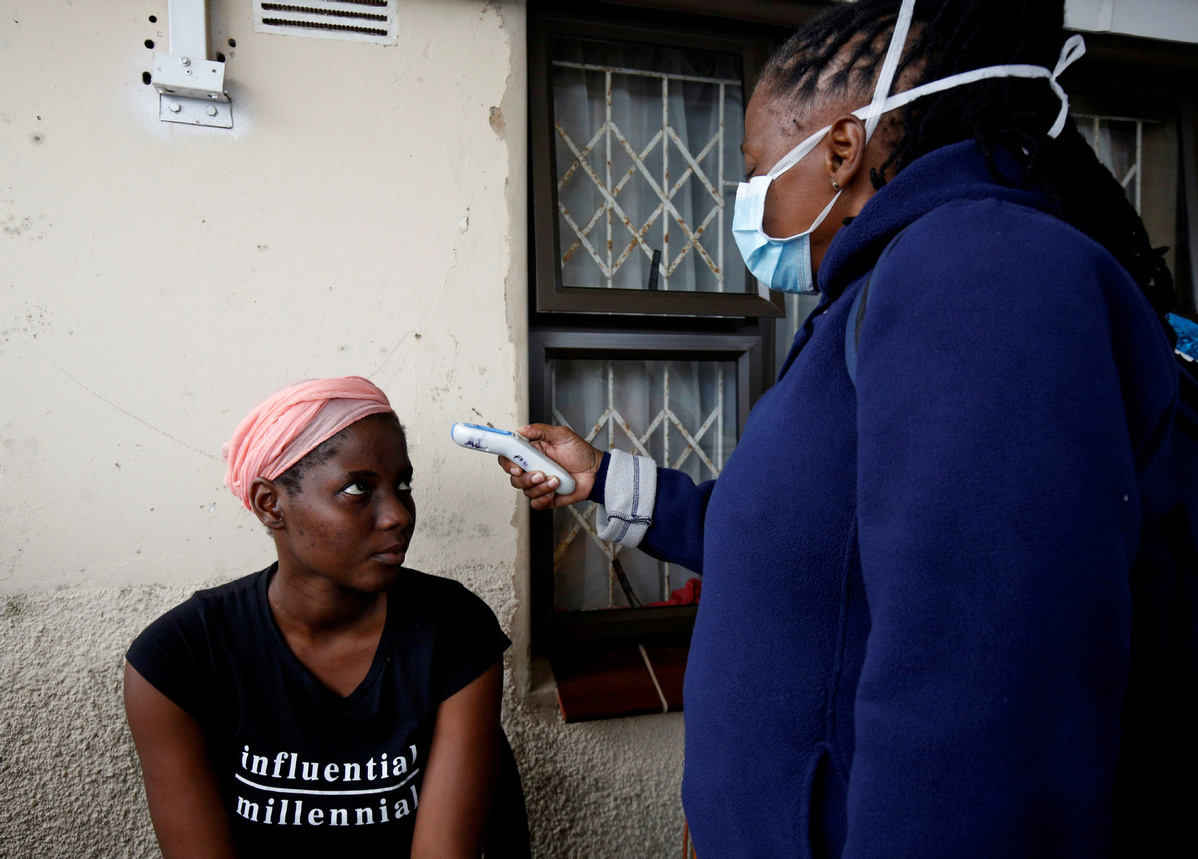
A health worker checks a woman's temperature during a door-to-door testing in an attempt to contain the coronavirus disease (COVID-19) outbreak, in Umlazi township near Durban, South Africa, April 4, 2020. (Photo: Agencies)
More than 8,000 health workers have been infected with novel coronavirus in Africa, according to the World Health Organization regional office for Africa.
"This is why infection prevention and control awareness is vital for all," the UN agency said on its official Facebook account on Tuesday.
As of Monday, Africa had reported 595,672 infected cases across its 54 countries, 13,254 deaths and 298,264 recoveries.
The WHO said with partners, it has trained over 50,000 health workers on how to protect themselves and patients and aims to reach over 200,000 by the end of the year.
The increasing number of infected healthcare workers has raised concerns on whether they have been equipped with adequate protective gear.
South Africa is the hardest-hit country in the continent in terms of total coronavirus infections, as well as in the number of healthcare worker infections.
In his coronavirus impact address to the parliament on July 8, Zweli Mkhize, the health minister, said about 4,821 healthcare workers in the private and public sectors had contracted the virus as of June 30.
He said Western Cape province accounts for the majority of infected healthcare workers, with 3, 285 infections.
"The leading number of infections is 2,473 infections among nurses, followed by other health professionals, including community health workers reporting 1, 971, and doctors recording 377 infections," Mkhize said.
In his earlier speech, the minister confirmed that over 30 healthcare workers have succumbed to the virus.
Mkhize said several interventions have been put in place to address infections among health care workers and that guidelines to support health workers across the continuum of care have been developed.
"A targeted training program has been designed and implemented to enhance the understanding of the pandemic and facilitate application of these guidelines, which primarily include infection prevention and control as well as case management," he said.
"In-service training of all health care workers to ensure that they can cope with management of the pandemic relative to their scope of work has been initiated."
Mkhize said they have sufficient personal protective equipment in stock.
Kenya has also recorded rapid increase in the number of healthcare workers infections. On July 8, Mutahi Kangwe, the cabinet secretary for health, confirmed that 257 healthcare workers had contracted the virus across the country.
Kangwe assured workers who have been exposed to the virus that the government is committed to ensuring that all frontline workers are protected at all times, by making available the necessary personal protective equipment and other commodities.
Unfortunately, on Friday, the east African country lost its first doctor to novel coronavirus, a 39-year-old obstetrician/gynecologist.
Pumwani Maternity Hospital, the largest and busiest maternity hospital in the country, boasting 354 bed capacity, 144 baby cots, three operation theaters, and an average of 60 daily deliveries, also has been hit by the wave of infected healthcare workers.
On Monday, 22 healthcare workers in the hospital tested positive for coronavirus, even as the Ministry of Health assured Kenyans that it was doing its best to keep the hospital staff, mothers and the newborns safe.
Some healthcare workers are still waiting for their results, following mass testing in the hospital, raising fears that the number of infected cases could increase.
Boaz Onchari, chair of Kenya National Union of Nurses, said it's a worrying trend to have more than 10 nurses testing positive in an institution.
"If we are supposed to take care of the community that is coming to seek our services, and now we are the people going into quarantine, who will be there to give the services?" Onchari asked.
He expressed concern that in some hospitals, like Pumwani Hospital, some patients are sharing beds at a time when social distancing is being emphasized.
Additionally, he said healthcare workers are facing a shortage of personal protective equipment.
However, Kangwe assured Kenyans that there is no need to panic and that the hospital situation will be assessed by medics.
"If we are confident that the hospital is clean, then it's not necessary to close the hospital. But the safety of people, children and infants will be paramount and the No 1 concern," Kangwe said.
As of mid-June, at least 68 Egyptian doctors had died of coronavirus and 430 had tested positive, according to the Egyptian Medical Syndicate.
In Nigeria, as of June 2, over 800 healthcare workers had contracted the virus, Premium Times reported.


